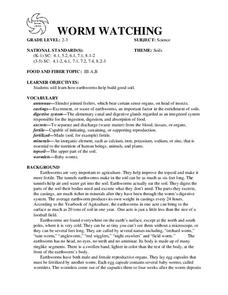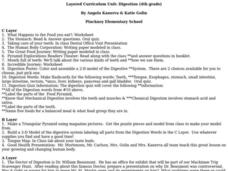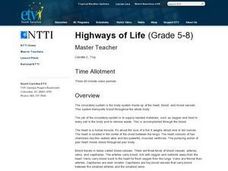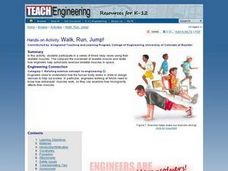Curated OER
WORM WATCHING
Students investigate how earthworms help build good soil. They examine the worms carefully to find the ringlike segments and swollen band at the front of the earthworm's body. Students take turns dampening the soil every day and adding...
Curated OER
Circulatory and Respiratory Systems
Eighth graders are able to write a paragraph describing each system based on the information retrieved in class. They trace a route from Holly Springs, MS to Greenwood using the maps that they were given. Students discuss the role of...
Curated OER
Digestion
Fourth graders answer the question what happens to the food you eat? They complete a worksheet about the food you eat. They discuss the different types of teeth that we have. Students complete digestion poster in which they color and...
Curated OER
Neurology Lessons
High schoolers create a model of a neuron using household items. They bring these items to school for model construction. Students utilize the Internet and other sources to categorize assigned chemical/neurotransmitter. They also...
Curated OER
Highways of Life
Students explore the circulatory system. They participate in media activities to explore blood flow and identify the parts of the circulatory sytem. Students create a model of the circulatory system.
Curated OER
Body and Blood
Students explore the cardiovascular system. Through the use of video, students observe the heart pumping an oxygen-enriched blood supply through arteries to the muscles in use during exercise. They participate in activities to explore...
Curated OER
Lub Dub
Students name the vessels and parts of the heart. They trace the path of blood through the heart. Students examine the function of the circulatory system. They recognize the differences between a hear when the body is at rest opposed to...
Curated OER
Coping with Changes
Middle schoolers build on knowledge of brain and nervous system in order to write about how their nervous systems help them cope with change in environment. Students navigate online sites to explore different parts of brain and nervous...
Curated OER
21st Century Medicine: Nerves of Steel
Young scholars model a sarcomere's action, they gain a kinesthetic and visual understanding of muscle contraction. They use this exercise stimulates the production of myosin and actin. Students use two colors of clay, make a "sandwich"...
Curated OER
Natural Born Robots: Body Builders
Students perform activities to explore how their arm works and what muscles are involved. They view animated comparisons of human and robotic arms. Students create a model of the human arm.
Curated OER
Studying Fossils
Students compare and contrast key skeletal differences between chimpanzees and humans: brain size, teeth, hand and thumb, trunk, pelvis, lower limb, foot and big toe. They then sort and group a set of mixed "fossil bones" of chimpanzee...
Curated OER
From Human Skeletons to Owl Pellets to Paleontology
Learners explore about the function of the skeleton and comprehend the names of the bones of the human skeleton. They compare bones of the human skeleton to a dinosaur skeleton and graph to compare these bones. Students sort bones to...
Curated OER
'Neuro-Bingo'
High schoolers discuss the nervous system and its pathology. They are then able to explain what neural physiology is. They use this game to further help them to develop clear meaning of the nervous system.
Curated OER
Skeletal System
Seventh graders identify and label twenty-five bones of the skeletal system. In small groups they glue various types of dried pasta to a large human body outline. They attach the pasta to the outline and label the pasta bones.
Curated OER
Digestive System Analogies--A Group Activity
Students study the human digestive system in order for the students to relate common kitchen items to the function of specific digestive organs. They list major organs on one side and find the item or appliance most analogous to the...
Curated OER
One + One=One
Students discover that learning can be fun. Problem solving skills are developed through various writing skills. Empower students with personal concept development and time management. Document growth and success of the learner....
Curated OER
TE Activity: Muscles, Muscles Everywhere
Young scholars study three different muscle types and investigate the affect of space travel on astronauts' muscles. They examine how exercise has a positive affect on muscle both on Earth and in space while looking at engineers' roles...
Curated OER
Kidney Filtering
Students investigate how kidneys function. They discuss how a dialysis machine works, and conduct an experiment in which they filter different substances through a plastic window screen, various sizes of hardware cloth, and poultry...
Curated OER
Walk, Run, Jump!
Students participate in a series of timed relay races using their skeletal muscles. They compare the movement of skeletal muscle and relate how engineers help astronauts exercise skeletal muscles in space. They list the three types of...
Curated OER
TE Activity: Sound Line
Students investigate the decibel readings of various noises. They determine why high-level readings damage hearing. Students arrange sound from the lowest to highest decibel levels when they written on a piece of paper.
Curated OER
TE Lesson: Can You Taste It?
Students investigate how animals adapt to use its senses to identify foods that are nutritious or noxious. They determine how they associate foods with other things such as birthdays. They discuss the role of the nervous system in the...
Curated OER
Digestive System
Students analyze how the digestive system works by taking the food we eat and breaking it down for our bodies to use for various reasons. They list the major components of the digestive system and draw a diagram. They explain how...
Alabama Learning Exchange
Systems Every "Body" Needs to Know
Through an informative WebQuest and group work, learners explore the human body and cell structure. They create a cell diagram, research a disease, write a letter explaining the causes of human disease, and work in small groups to create...
Curated OER
Ourselves
Students identify the main parts of the human body. They point to various parts of their own body, cut out pictures of humans and animals and sort them into the two categories, discuss the differences between animals and humans, and...

























